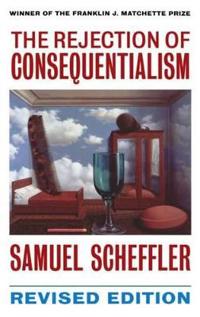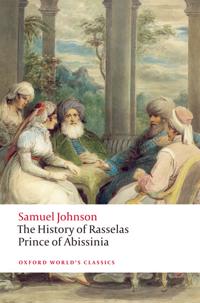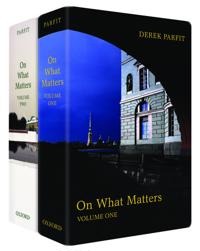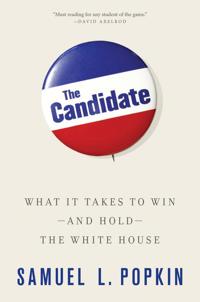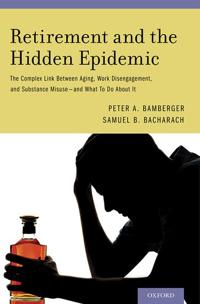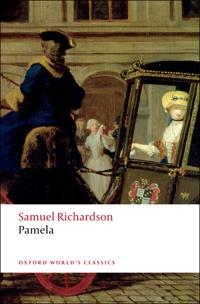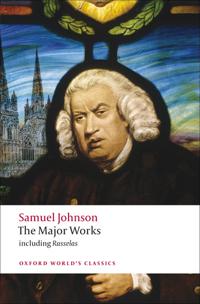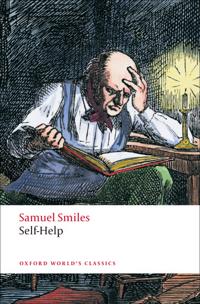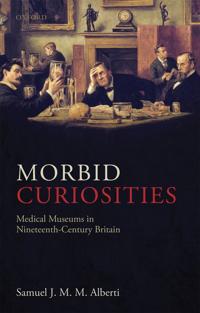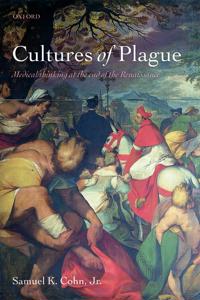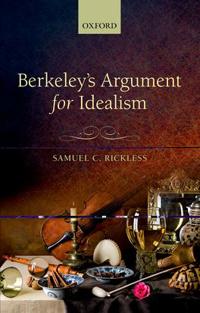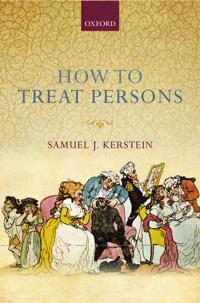The Rejection of Consequentialism (Pocket)
avSamuel Scheffler
ISBN: 9780198235118 - UTGIVEN: 1994-09In contemporary philosophy, substantive moral theories are typically classified as either consequentialist or deontological. Standard consequentialist theories insist, roughly, that agents must always act so as to produce the best available outcomes overall. Standard deontological theories, by con[...]
Oxford Reading Tree: Level 6: Fireflies: Food as Art (Pocket)
avMadeline Samuel, Thelma Page, Mary Mackill, Liz Miles, Gill Howell
ISBN: 9780198473015 - UTGIVEN: 2008-09-04Oxford Reading Tree: Stage 8: Fireflies: Shipwrecks (Pocket)
avMadeline Samuel, Thelma Page, Liz Miles, Gill Howell, Mary Mackill, Lucy Tritton
ISBN: 9780198473183 - UTGIVEN: 2008-09-04Samuel Pepys and his Books
ISBN: 9780198732686 - UTGIVEN: 2015-08Samuel Pepys was a great collector of books, news, and gossip. This study uses his surviving papers to examine reading practices, collecting, and the exchange of information in the late seventeenth century. Offering the first extensive history of reading during the Restoration, it traces development[...]
Divine Teaching and the Way of the World: A Defense of Revealed Religion (Inbunden)
avSamuel Fleischacker
ISBN: 9780199217366 - UTGIVEN: 2011-04-21The Lives of the Poets (Häftad)
avSamuel Johnson
ISBN: 9780199226740 - UTGIVEN: 2009-05'If a man is to write A Panegyrick, he may keep vices out of sight; but if he professes to write A Life, he must represent it really as it was.' In the last of his major writings, Samuel Johnson looked back over the previous two centuries of English Literature in order to describe the personalities[...]
The History of Rasselas, Prince of Abissinia (Häftad)
avSamuel Johnson
ISBN: 9780199229970 - UTGIVEN: 200906'What then is to be done? said Rasselas; the more we inquire, the less we can resolve.' Rasselas and his companions escape the pleasures of the 'happy valley' in order to make their 'choice of life'. By witnessing the misfortunes and miseries of others they may come to understand the nature of happ[...]
Samuel Taylor Coleridge and the Fine Arts (Inbunden)
avMorton D. Paley
ISBN: 9780199233052 - UTGIVEN: 2008-07-10On What Matters (Inbunden)
avDerek Parfit, Samuel Scheffler, Derek Parfit
ISBN: 9780199265923 - UTGIVEN: 201106On What Matters is a major work in moral philosophy. It is the long-awaited follow-up to Derek Parfit's 1984 book Reasons and Persons, one of the landmarks of twentieth-century philosophy. Parfit now presents a powerful new treatment of reasons, rationality, and normativity, and a critical examinati[...]
The Candidate (Häftad)
avSamuel L. Popkin
ISBN: 9780199325214 - UTGIVEN: 2013-10There are two winners in every presidential election campaign: The inevitable winner when it begins-such as Rudy Giuliani or Hillary Clinton in 2008-and the inevitable victor after it ends. In The Candidate, Samuel Popkin explains the difference between them. While plenty of political insiders have [...]
Retirement and the Hidden Epidemic (Inbunden)
avPeter A. Bamberger, Samuel B. Bacharach, Peter A. Bamberger
ISBN: 9780199374120 - UTGIVEN: 2014-06Evidence from both local and national surveys suggests that substance misuse and abuse among older adults in the United States is a "hidden epidemic" that poses a major threat to the welfare and quality of life of older drinkers and their families, and has significant public health implications. Ba[...]
Pamela (Pocket)
avSamuel Richardson, Thomas Keymer, Alice Wakely
ISBN: 9780199536498 - UTGIVEN: 200808'Pamela under the Notion of being a Virtuous Modest Girl will be introduced into all Familes,and when she gets there, what Scenes does she represent? Why a fine young Gentleman endeavouring to debauch a beautiful young Girl of Sixteen.' (Pamela Censured, 1741) One of the most spectacular successes [...]
The Major Works (Häftad)
avSamuel Johnson
ISBN: 9780199538331 - UTGIVEN: 200812This authoritative edition was formerly published in the acclaimed Oxford Authors series under the general editorship of Frank Kermode. It brings together a unique combination of Johnson's poetry and prose - all the major poems, complemented by essays, criticism, and fiction - to give the essence of[...]
Witness to Extinction (Häftad)
avSamuel T. Turvey
ISBN: 9780199549481 - UTGIVEN: 200908The tragic recognition of the extinction of the Yangtze River Dolphin or baiji in 2007 became a major news story and sent shockwaves around the world. It made a romantic story, for the baiji was a unique and beautiful creature that features in many Chinese legends and folk tales. The Goddess of the [...]
Self-Help (Häftad)
avSamuel Smiles
ISBN: 9780199552450 - UTGIVEN: 200809'The spirit of self-help is the root of all genuine growth in the individual; and, exhibited in the lives of many, it constitutes the true source of national vigour and strength.' A bestseller immediately after its publication in 1859, Self-Help propelled its author to fame and rapidly became one of[...]
Selected Poetry (Pocket)
avSamuel Taylor Coleridge
ISBN: 9780199555826 - UTGIVEN: 2009-01-29This selection of Coleridge's finest verse, chosen from the acclaimed Oxford Authors critical edition, includes Fears in Solitude, Frost at Midnight, Kubla Khan, and both earlier and later versions of The Rime of the Ancient Mariner.[...]
On What Matters (Inbunden)
avDerek Parfit, Samuel Scheffler, Derek Parfit
ISBN: 9780199572816 - UTGIVEN: 201106On What Matters is a major work in moral philosophy. It is the long-awaited follow-up to Derek Parfit's 1984 book Reasons and Persons, one of the landmarks of twentieth-century philosophy. Parfit now presents a powerful new treatment of reasons, rationality, and normativity, and a critical examinati[...]
Morbid Curiosities (Inbunden)
avSamuel J. M. M. Alberti
ISBN: 9780199584581 - UTGIVEN: 201104In the first comprehensive study of nineteenth-century medical museums, Morbid Curiosities traces the afterlives of diseased body parts. It asks how they came to be in museums, what happened to them there, and who used them. This book is concerned with the macabre work of pathologists as they dismem[...]
Lyrical Ballads (Pocket)
avWilliam Wordsworth, Samuel Taylor Coleridge
ISBN: 9780199601967 - UTGIVEN: 2013-07-11Wordsworth and Coleridge's joint collection of poems has often been singled out as the founding text of English Romanticism. This is the only edition to print both the original 1798 collection and the expanded 1802 edition, with Wordsworth's famous Preface. It includes important letters, a wide-rang[...]
Cultures of Plague (Häftad)
avJr. Samuel K. Cohn
ISBN: 9780199605095 - UTGIVEN: 201103Cultures of Plague opens a new chapter in the history of medicine. Neither the plague nor the ideas it stimulated were static, fixed in a timeless Galenic vacuum over five centuries, as historians and scientists commonly assume. As plague evolved in its pathology, modes of transmission, and the soci[...]
The Oxford Handbook of Samuel Taylor Coleridge (Pocket)
avFrederick Burwick
ISBN: 9780199644179 - UTGIVEN: 2012-02-01A comprehensive survey of Samuel Taylor Coleridge's writings as a poet and literary critic, as a philosopher and lecturer, as a commentator on religion and politics. Provides 37 specially written contributions by an international team of experts providing the most advanced scholarship in each area.[...]
Berkeley's Argument for Idealism (Inbunden)
avSamuel C. Rickless
ISBN: 9780199669424 - UTGIVEN: 2013-01Samuel C. Rickless presents a novel interpretation of the thought of George Berkeley. In A Treatise Concerning the Principles of Human Knowledge (1710) and Three Dialogues Between Hylas and Philonous (1713), Berkeley argues for the astonishing view that physical objects (such as tables and chairs) a[...]
How to Treat Persons (Inbunden)
avSamuel J. Kerstein
ISBN: 9780199692033 - UTGIVEN: 201302Samuel J. Kerstein develops a new, broadly Kantian account of the ethical issues that arise when a person treats another merely as a means, that is, 'just uses' the other and thereby acts wrongly. He takes his inspiration from Immanuel Kant's 'Formula of Humanity', which commands that we treat perso[...]

